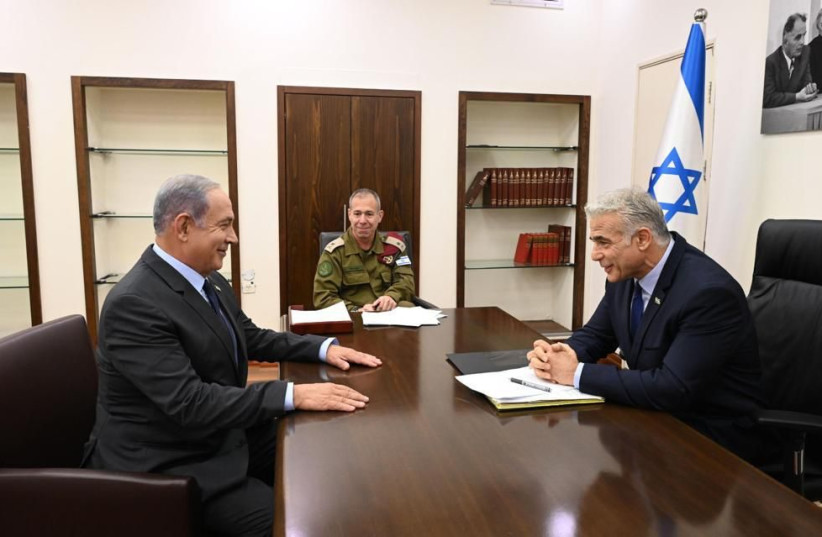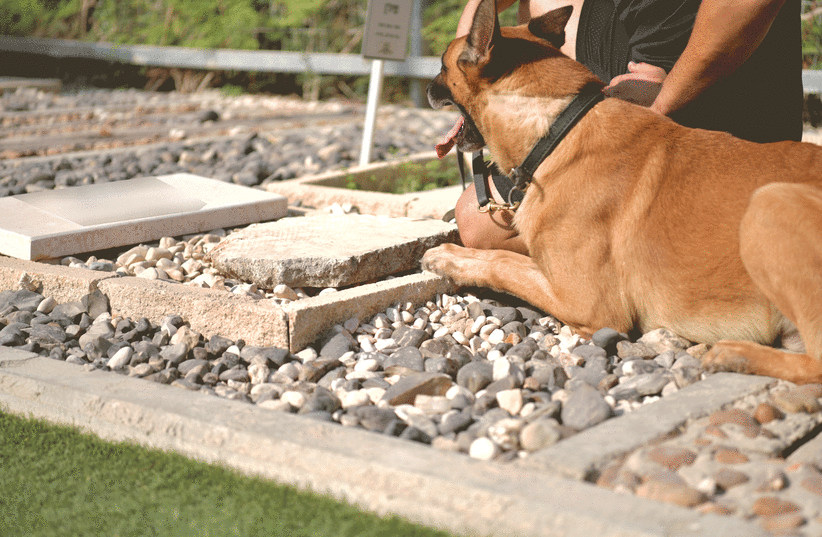As Israelis know all too well, when the country goes to war, it also comes together. It happened when Menachem Begin joined the government of Levi Eshkol ahead of the Six Day War in 1967, and it happened to some extent when Benny Gantz joined Benjamin Netanyahu’s government just a few weeks into the outbreak of COVID-19.
Israelis got a taste of this “unity” on Sunday, when in the midst of the fighting in Gaza, Netanyahu went to the Prime Minister’s Office for a briefing with Yair Lapid. It was the first time Netanyahu had met with a prime minister since he was removed from office last summer.
As head of the opposition, Netanyahu is entitled – by law – to meet once a month with the prime minister to receive a security and intelligence briefing. Until last summer, and as long as Netanyahu was prime minister, those meetings occurred regularly. But when Naftali Bennett became prime minister, Netanyahu refused to meet him. Instead, he asked for an occasional briefing with the prime minister’s military aide. Bennett, who was equally unenthusiastic about meeting Netanyahu, readily agreed.
Lapid refused. If Netanyahu wanted a briefing, he would have to come to the office to meet him. So that’s what Netanyahu did on Sunday, and pictures showed the two men sitting opposite one another smiling. After the meeting, Netanyahu put out a statement declaring his support for Israel’s security forces and the government during this time of war.
On Sunday night, when the ceasefire went into effect, it was a sign for the shooting to stop – but only in Gaza. In Israel, the politicians were oiling their guns.
By the following evening, Netanyahu had released a video saying that while he supported the government during the fighting, now he could tell the truth: if the country had not been on its way to an election, Lapid would never have been able to launch an operation in Gaza, since he would have been handcuffed by the Arab party Ra’am.
It was a sign that all was back to normal. The Gaza operation was done. Israelis could go back to mudslinging.

Israeli Prime Minister Yair Lapid's tight ship
BY ALMOST every metric, the three-day operation called Breaking Dawn was a success: targets were chosen carefully and struck surgically; Iron Dome intercepted 96% of rockets on their way to civilian centers; and when it came to public diplomacy, the government’s response was quick and smooth. The way it handled the fallout from the explosion in Jabalya on Saturday night – caused by a failed Islamic Jihad rocket launch – gives hope that strategic mistakes of the past will hopefully remain in the past.
From the beginning, this operation felt different, mostly because the government made clear from the start that it was determined to end it quickly. Lapid was extremely careful in his authorization to the IDF, and which targets it was allowed to strike. Go back to the Gaza war of 2014, which lasted 50 days. It was completely different. That Netanyahu-led cabinet could not figure out what it wanted, nor how it would achieve it.
This time, Lapid ran a tight ship. There was no evident infighting in the cabinet, no leaks by the IDF against the government or vice versa (as we’ve seen in the past), and the military was given strict and clear instruction to keep its attack focused on Islamic Jihad so Hamas would stay out of the fray.
There were a number of instances when the army came to Lapid to ask for authorization for different maneuvers that the prime minister refused to approve. His reasoning was that the operation needed to focus only on Islamic Jihad, and any action that could draw in Hamas was not in Israel’s interest.
The public diplomacy side of the operation – ensuring a quick response to the Jabalya explosion, releasing timely video evidence, and sending out a minister from a security cabinet meeting to brief journalists – was a refreshing break from the past. Just recall last year’s bombing of the AP office building in Gaza. Still today, 15 months later, the IDF has yet to issue a clear explanation of why it did what it did.
Hamas’s decision to sit on the sidelines is worth pondering. It spared Israel a wider conflict that would not have ended after just 55 hours and would have included 1,000 rockets being fired in a single day, not over three. On the other hand, Hamas would have suffered significant casualties and damage to infrastructure, which it has yet to rebuild since last year’s 12-day operation.
Unlike what some would have you believe, Hamas’s decision not to fight should not be interpreted as a sign of moderation, or weakness, or a sudden desire to build up the lives of the population in Gaza. It did not suddenly come to terms with Israel’s existence, or decide that it wants to put behind its terrorist past . Even as you read this, be assured that Hamas is contemplating ways to attack Israel, kill and kidnap Israelis, and work to amass more rockets and weapons inside Gaza while digging tunnels along the border.
But what it does mean is that Hamas might have become a bit more pragmatic – in part because it needs to continue rebuilding its infrastructure, but also continue to manage the Gaza Strip. With 14,000 Palestinians crossing daily into Gaza and more economic opportunities on the horizon, it did not want to risk all of that over the whims of Islamic Jihad. When it wants, Hamas will initiate a conflict.
That is why this situation presents Israel with an opportunity, but also a risk. There is little doubt that another conflict, outright war, is just a matter of time. Since Israel withdrew from Gaza in 2005, the story has only been one of war and bloodshed, an operation taking place on average once every two years.
Breaking the Gaza cycle of violence
Can that cycle be broken? That is the question Israelis should be asking themselves now that Breaking Dawn is done.
There are no magical solutions. But the results of last weekend’s conflict should prompt us to look at what innovative steps we can take – more worker permits, indirect talks with Hamas regarding a long-term ceasefire, a seaport for Gaza – to try to stave off the next war, not just for ourselves but also for the people of Gaza.
The death of Zili, Israel's “four-legged hero”
If there is one thing in this country that is sacred, it is the fallen. When a soldier dies in battle, politics fall to the side and people come together. When bereaved families yell at prime ministers, those politicians stand and take it in silence. That is Israel. That is how things are done.
But on Tuesday, this country went too far. That morning, the police’s elite Counterterrorism Unit Yamam went into Nablus in pursuit of a top wanted Palestinian terrorist. The terrorist was killed during the ensuing firefight, as was one of the Yamam’s military service dogs, a Belgian Shepherd named Zili.
Every website ran a story on Zili (as did we), and every newspaper ran a story about him the following day. One Hebrew daily dedicated almost the entire bottom half of its front page to what it called a “four-legged hero.” One news TV show asked Zili’s handler what year the dog enlisted in the Yamam. And he was serious, even though dogs don’t enlist. People enlist. Dogs are born, trained and put to work.
Even Lapid put out a statement, writing that Zili was part of the unit, was loved, was professional. “He will be missed,” the prime minister wrote.

Is everything okay?
It is perfectly fine to report on the death of a dog during a military operation; but have we not gone a bit overboard? Is it possible that Israelis have lost some sense of proportion?
This was particularly striking as Zili’s death came just two days after the operation ended in Gaza, an operation that – despite not being Israel’s fault – included the deaths of Palestinian children.
This is not about blame or responsibility but about empathy and humanity. Israel was not responsible for the deaths of the children in Jabalya, which were caused by an Islamic Jihad rocket that fell short. On the other hand, it was an Israeli bomb that killed Alaa Qadoom, a five-year-old Palestinian girl who was in the apartment building struck by Israel while targeting Islamic Jihad leader Tayseer Jabari last Friday.
This is not a judgment on whether the targeting of Jabari was right or wrong – it was 100% legitimate, necessary and legal – but rather on the question of compassion. Hiding in a residential apartment building is the cynical way Palestinian terrorists make use of human shields. That is well documented, and the blood of those victims is on their hands.
Nevertheless, where were the pictures of Qadoom in the Israeli press? Where were the statements by the prime minister or others? There may not have been a need for Israel to apologize for her death, since the bombing was just, but should there not have been a mention somewhere?
The lack of proportion was highlighted by the original Zili, the nickname of former soldier Ben Silberstein who trained the Yamam dog. Silberstein wrote on Facebook that while he was proud to see the dog that was named for him referred to as a hero, he was uncomfortable with the silence when it came to Qadoom’s death.
There is no clear answer, but it is worth thinking about – for us in the media, and also for the average Israeli. Our battle in this land is just, legal and undeniable. But let’s not forget something basic – compassion, even when we are right.
